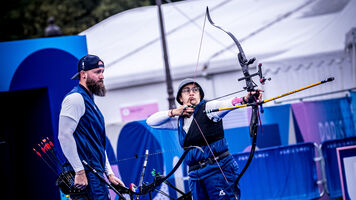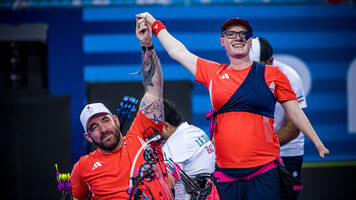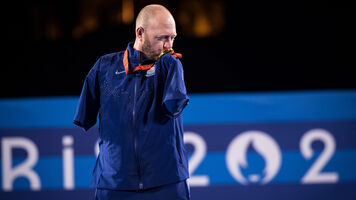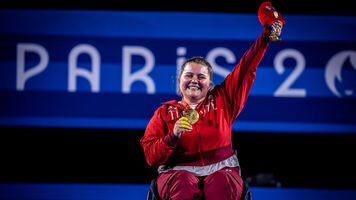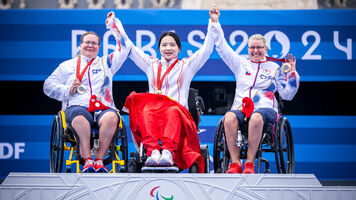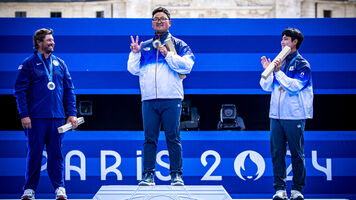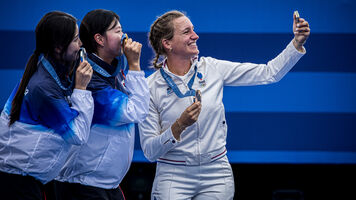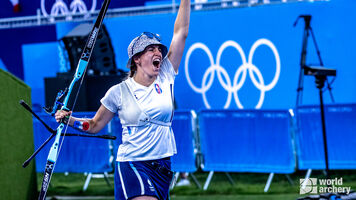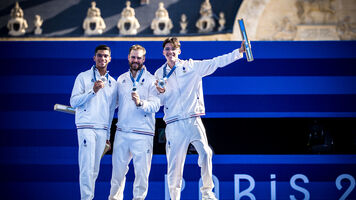Viktor Sidoruk: Celebrating 40 years as an Olympic coach

Viktor Sidoruk will be 80 years old on 4 September 2017. He has spent 55 of those years in archery, of which 40 have been dedicated to the Olympic cycle as a coach.
Born in Lviv, Ukraine, when it was still part of the USSR, he competed at the Munich 1972 Olympics, when archery returned to the Games after a 52-year absence. He finished seventh with 2427 out of 2880 points – back then, the archery competition consisted of a double 1440 (then FITA) round, in which archers shot 36 arrows at each 90, 70, 50 and 30 metres, twice.
One year later, at the World Archery Championships in Grenoble, France, he won gold individually and collected a silver with the recurve men’s team.
Throughout his career as an athlete, Viktor won more than 80 gold medals at different world and European championships – but before being an archer, he had a different sporting passion.
“When I was younger, I was part of the Ukrainian national wrestling team,” he explained. “Then, in 1960, I started working and through those things that happen in life, I learned about archery.”
“I was fascinated with all the skills involved in the sport, especially by the fact that archery is a mix of mental, technical and physical aspects. It’s a sport where you are competing against yourself, where the sense of winning is just one of the best feelings you can ever feel.”
That feeling, the one of winning, took Viktor along a different path in his career: coaching.

Viktor decided that he wanted to pass on his experience and expertise to others. He became head coach of the USSR squad in 1975, one year before the 1976 Olympic Games in Montreal, Canada. The results at those Games, 40 years ago, delivered results far beyond his expectations.
The USSR won silver and bronze with Valentina Kovpan and Zebiniso Rustamova in the recurve women’s competition and had a fifth place finish with one of the men.
But that was just the beginning of his successful Olympic career as an archery coach.
“In 1989, I was invited by the Spanish Archery Federation to assist their athletes in their training for the Olympics,” Viktor recalled. “In 1990, I became head coach and, two years later, at the Barcelona 1992 Olympic Games, the recurve men’s team won gold on home soil.”
He then moved to Italy and helped that country’s recurve men’s team win bronze at Atlanta 1996, before returning to his home country after Sydney 200. With Viktor in command, Ukraine won at least one medal in each of the Athens 2004 and Beijing 2008 Olympic Games.
London 2012 is the only Games since he took up the reigns in Ukraine, that Viktor and his team missed the Olympic podium.
“I think that the Olympics is the event that any elite athlete dreams of, as it can’t be compared to any other event. It's the place where only the best of the best competes. You want to win, but they want to win too, so you have to be physiologically prepared, you have to be committed to it and you have to undergo extreme training in preparation,” Viktor said.
His last Olympic Champion was Viktor Ruban, in 2008, who remains part of the Ukrainian men’s squad searching for a full quota place for the Rio 2016 Olympic Games at the third stage of the year’s Hyundai Archery World Cup in Antalya.
(Ahead of the final qualifying tournament, Ukraine had only secured one individual spot in each the women’s and men’s competitions.)

“I have never seen a field with 240 recurve men, in which most of them are still in the fight for Olympic place, before. If you see the scores at this event, you'll see that the average has gone up 20 points in the last few years,” Viktor said.
“Before, it was easy to see arrows landing in the blue or in the black, nowadays most of them end in the yellow rings. It means that the archers’ skill has improved dramatically!”
Viktor’s teams have been at the heart of that improvement. Despite changes in equipment and popular technique, Viktor’s archers have remained relevant. Through Olympics and world and continental championships, though, it’s his teams that have been the strength, rather than individuals.
“I think it’s easier to get a medal with team, because if there are 150 athletes, 70 will have good skills, 35 will have high ones and to get better than that, well, it’s going to be extremely difficult,” he explained. “In a team you just have to win against the other 15. That’s easier, although not just anyone could be on the team.”
In 2014, Ukraine won World Archery Indoor Champion titles with both the recurve men’s and women’s squad, and just two weeks before Antalya, the women became European Champion.
“It’s important that the three athletes on the team are all at the same level, that they can understand and can help each other. Only if they have these three qualities, they are going to be able to be on top, shooting arrow by arrow to win,” Viktor added.
“That’s why the coach is so important. A good coach needs to identify the qualities of each of the athletes before training them properly and advising them on how to improve, and it's not as easy as it sounds. The coach is responsible for the archers, but the archer is also responsible for himself. I get headaches about each of them on every tournament!”
The former wrestler maintains, though, that a good archer is more than just one that shoots good scores.
"A good archer also has to be a good person, needs to tolerate others, be easy going, be an open person and, most importantly, disciplined,” said Viktor. “An archer should also treat his coach with love, respect and understanding.”

“Everyone can shoot good scores every now and again, but to shoot high and consistent results you have to be an athletic archer, well prepared in every possible sense, even mentally stable. It’s not just about shooting well, no, it’s all about combining and making all the elements work in harmony,” he added.
At the Hyundai Archery World Cup stage in Antalya in 2016, Viktor has a clear goal: qualifying both the recurve women’s and men’s team to the Rio 2016 Olympics Games – the Games, Viktor believes, that may well be his last.
While saying how difficult it was to explain how different archery was when he first coach at the Olympics 40 years ago when compared with the modern day, due to equipment advances and rule changes, Viktor also said he believed there was still room for improvement. And it would be improvement he would follow for the rest of his days.
“The future for archery is huge and I’m sure more countries will start developing it – and I will be cheering on all of them for as long as I have left,” he said.
“Through my 55 years in archery, I have won medals not just at the Olympics but at any archery event you could possibly imagine. I have achieved a lot, but I still have one more dream to make a reality: win gold with a recurve women’s team at Rio 2016.”
Whether he claims that last trophy for his cabinet or not, Viktor is a man who talks like his time behind the international shooting line is coming to a close. If he calls it a day, he will finish his career as probably the most successful Olympic coach in archery’s history, and definitely one of the most respected.
“Maybe I will retire after the Olympics in Rio, but probably I won’t see my dream come true,” Viktor concluded.
No doubt, though, that he won’t have left anything behind in his preparations to see that his 40-year anniversary Olympic Games as a head coach are just as successful as his first.


